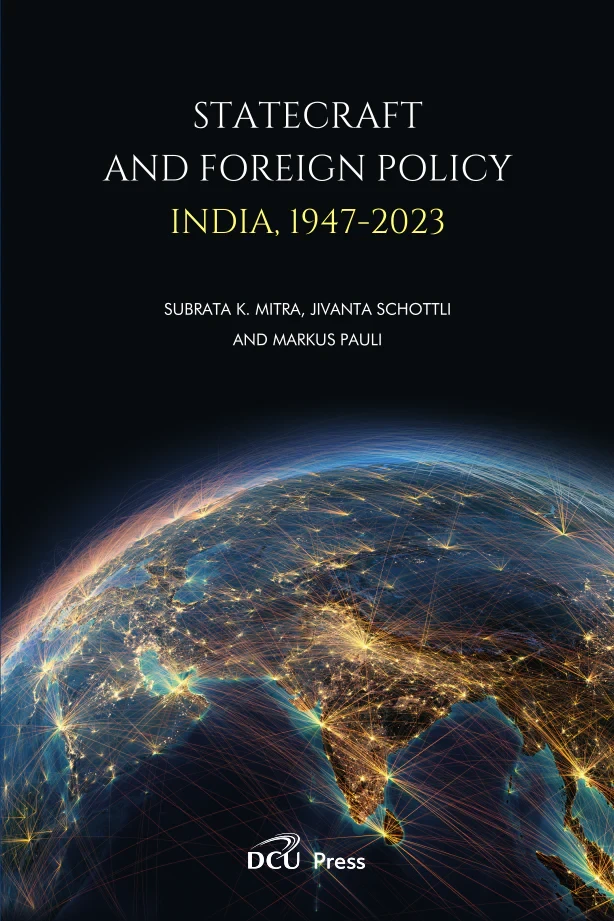
Statecraft and Foreign Policy: India, 1947-2023
India, 1947-2023
Professor Subrata K. Mitra (Author), Dr Jivanta Schottli (Author), Dr Markus Pauli (Author)
Statecraft and Foreign Policy provides an in-depth understanding of India’s rise as an economic and political power and its role in addressing global challenges, from climate change to international trade, security, health and energy. It focuses on India’s statecraft and foreign policy from its independence in 1947 to current politics and policies in 2023 – 75 years later.
The book has three main sections, focusing on the evolution of India’s foreign policy after Independence, its transformation after the Cold War and as India’s economic and political power grew, and India’s engagement with major powers (like the US, China and Russia), neighbouring countries, and international institutions. The analysis draws on International Relations Theory, Foreign Policy Analysis, and the work of classic Indian thinkers like Kautilya. It combines evaluating domestic and international influences on India’s statecraft and foreign policy.
The authors introduce a ‘toolbox’ for studying the making and the outcomes of Foreign Policy based on an analysis of interests, perceptions, and values. This analytical framework goes beyond the Indian case study and can be applied to International Relations, Comparative Politics, and Foreign Policy Analysis.
1 Introduction
Section 1: The evolution of India’s foreign policy: domestic determinants, regional dynamics, and global politics
2 Engaging the world. foreign policy and nation-building in India
3 Classic non-alignment: Jawaharlal Nehru’s foreign policy
4 Indira Gandhi and the radical break in India´s foreign policy
5 From Rajiv Gandhi to Narendra Modi: continuity and change in India’s foreign policy
Section 2: India’s search for power in a post-cold war, multi-polar world
6 Nuclearization in 1998 and the Kargil War in 1999
7 Major shifts in Indo–US relations: from ambivalence to engagement
8 India’s relations with China and Russia
9 India and South Asia
10 India and the EU, the Middle East and BRICS
Section 3: India’s multilateral engagements
11 Globalisation and India: trade, international organizations and aid
12 Climate change, energy, and international negotiations
13 India, ASEAN, the Indian ocean, and the Indo-Pacific
14 India and global security challenges
15 Conclusion
DOI: 10.59949/9781739354220
Number of pages: 362
Publication date: 15 December 2023
PDF ISBN: 9781739354220
Hardback ISBN: 9781739354206
Paperback ISBN: 9781739354213
Professor Subrata K. Mitra (Author) 
Professor Subrata K. Mitra, PhD (Rochester), is an adjunct professor at DCU and Emeritus Professor of Political Science at Heidelberg University, Germany.
Dr Jivanta Schottli (Author) 
Dr Jivanta Schottli is Assistant Professor in Indian Politics and Foreign Policy at the School of Law and Government, DCU.
Dr Markus Pauli (Author) 
Dr Markus Pauli is Assistant Professor in Political Science at the School of Law and Government, DCU.
‘Mitra, Schottli, and Pauli have crafted a remarkably deep analysis of India’s foreign policy. They have not only reviewed the details of India’s foreign affairs, itself no small task, but they have done so in an analytic framework grounded in a profound evaluation of the intertwining of domestic and foreign policy choices and compunctions. As contemporary India has emerged as one of the world’s great powers – great in every sense of that term – this book is essential reading for policymakers, diplomats, scholars, and students of Indian affairs and world affairs. Statecraft and Foreign Policy is a tour de force that will define how we think of India in global politics for decades to come!’
Bruce Bueno de Mesquita, Julius Silver Professor of Politics, New York University, USA
‘A sweeping overview, in holistic perspective. Covers independent India’s 75 years, narrating policy development and diplomatic actions. Incisive, balanced, and insightful.’
Kisan S. Rana, Emeritus Professor and Former Ambassador of India to Germany
‘This book offers both a wide compass of Indian foreign policy across its 76 years but also a focused lens that assesses change and continuity across different periods and varied dimensions of foreign policy. Domestic and international variables are brought together in the analysis with a focus on how the Prime Ministers think about and visualize their foreign policies. Each chapter provides a synoptic assessment including additional readings making it an excellent reference that brings analysis of foreign policy up to date. The discussions of India’s multilateral engagements on trade, climate change and international negotiations is a valuable addition to usual bilateral discussions of foreign policies.’
Aseema Sinha, Wagener Chair of South Asian Politics and George R. Roberts Fellow at Claremont McKenna College in California, USA
‘The authors have done the almost-impossible – they have provided a synopsis of the most important phases, relationships, and issues that mark the country’s policies beyond its borders. And they have done it engagingly and with sophistication…free of jargon and abstruse theorizing, and yet with a penetrating point of view.’
Professor Kanti Bajpai, Lee Kuan Yew School of Public Policy at the National University of Singapore
